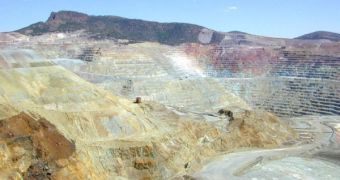The House and Senate approved on Friday the final stimuls bill, which awards more than $1.5 billion to agencies such as the Bureau of Land Management (BLM), the National Park Service (NPS) and the Forest Service for various ongoing projects, as well as for the beginning of cleaning operations in various parts of the country. The most important thing on the agenda is the clean-up of areas around open-pit mines, which are severely contaminated with cyanide that was advertised as being environment-friendly at the time of their opening.
According to the Government Accountability Office (GAO), there are currently in excess of 161,000 hard rock mines throughout the United States, most in Alaska, South Dakota, and in 11 western states. Cleaning them up is a massive challenge, which is further made even more difficult by the fact that the money that has been received from the federal government can be spent on equipment as well, which means that the agencies have to decide on how they want to pay the dollars out.
“These much needed funds will create thousands of jobs, reduce water pollution, eliminate public safety threats, and restore fish and wildlife habitat in rural communities across the country,” the policy director for environmental group Earthworks, Lauren Pagel, argues. The organization focuses its efforts on mining issues, and especially on the dangers that loom in the areas where the exploitations have been shut down. In addition to the open pits themselves, there are also decaying structures at various sites, which can collapse at any moment and take careless bystanders by surprise.
Moreover, given that the problem is so widespread, correcting it may prove to be extremely difficult. The Environmental Protection Agency (EPA) estimates that the federal government will have to allot well over $50 billion, in order for all former hard rock mining sites to be thoroughly cleaned.
There are, of course, organizations that oppose this plan, under the pretext that they encourage less federal spending. One of these groups is the National Taxpayers Union, which has recently announced through its spokesman Pete Sepp that clean-ups are temporary, and that they do not help the economy. Environmental groups uphold that such attitudes show bad intentions, because the health risk posed by these exploitations is massive, considering that cyanide and arsenic constantly infiltrate ground waters and then make their way to people's water reserves.

 14 DAY TRIAL //
14 DAY TRIAL //